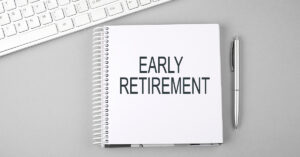How’d you like to get your share of $1.35 trillion?
This is how much money was in the combined 24 million 401(k) accounts left behind at previous employers as of May 2021. You see, data from the U.S. Bureau of Labor Statistics shows that individuals who were born between 1957 and 1964 typically worked at an average of 12.4 different jobs between the ages of 18 and 54. What’s more, workers have recently been quitting their jobs en masse, in an event that’s been called the “Great Resignation.”
As a result, a lot of people have left behind 401(k) accounts with money still in them. If this includes you, we suggest you track that money down. The average balance in a forgotten account is around $55,400. And, over a lifetime, the failure to reclaim these funds could cost you as much as $700,000 in retirement savings. So, all of this begs the question: How exactly do you recover this money?
How to Find Your Old Plan
Finding your old plan may be easier said than done, however. There are a number of reasons why this is the case.
For example, hundreds of thousands of U.S. businesses closed their doors permanently during the first year of the pandemic. Furthermore, you may have moved and/or changed your email address. making it difficult for your previous employers to find you. Rest assured, a qualified financial advisor can help you (contact us, we can help!)
First, you should make a list that includes every place where you worked and contributed to a 401(k). Next, call each one to make sure they haven’t folded and still have an account in your name. Also, if needed, update your contact information with them.
As we mentioned, company closings, mergers, and 401(k) servicer changes can make an old account harder to trace. If your attempts to contact your previous employer or the plan administrator are unsuccessful, search for the plan information on the U.S. Department of Labor website. It may be able to help you when it comes to plans dating back to 2010.
What to do Next
Once you’ve located your old account, work with an advisor to roll the funds over directly into a new account. Make sure your money is sent to the receiving financial institution and does not land in your bank account first. Failure to take this step could result in a 20% tax withholding on the funds distributed.
The next key step is ensuring that ll of your old accounts are consolidated. It’s difficult to devise a financial strategy when your money is held in several locations. it’s important to keep things simple when it comes to account management.
And lastly, to keep things as simple as possible, and make the most of your retirement savings, remember to put consolidating your accounts at the top of your priority list whenever you leave a job. You don’t want to put it of, and end up having to take the time tracking down all your old accounts. So, consolidate as you go!
Where to Find Other Types of Forgotten Funds
The money in a 401(k) isn’t the only asset that could be lost or forgotten. Consider insurance accounts, unpaid wages, pensions from former employers, tax refunds, and savings bonds, among other places where money is stored and could go overlooked by accident.
The National Association of Unclaimed Property Administrators (NAUPA) reports that about 1 in 10 Americans have unclaimed property and that a combined $3 billion is returned to owners each year.
Brokerage firms and other financial institutions have to report unclaimed or abandoned accounts, once they have made diligent efforts to locate the owner. Should they be unsuccessful, they must report it to the state agency that handles the matter. The agency then claims it, through a process called escheatment, so the proper owners can find it.
There are a number of places where you can find additional information on how to reclaim the money from various old accounts. However, one thing to keep in mind: claiming your assets is free. Be wary of anyone who wants to charge you for doing so.
Need help tracking down your old 401(k) and rolling the money over into a new account? We can help with that! Reach out to us today.








